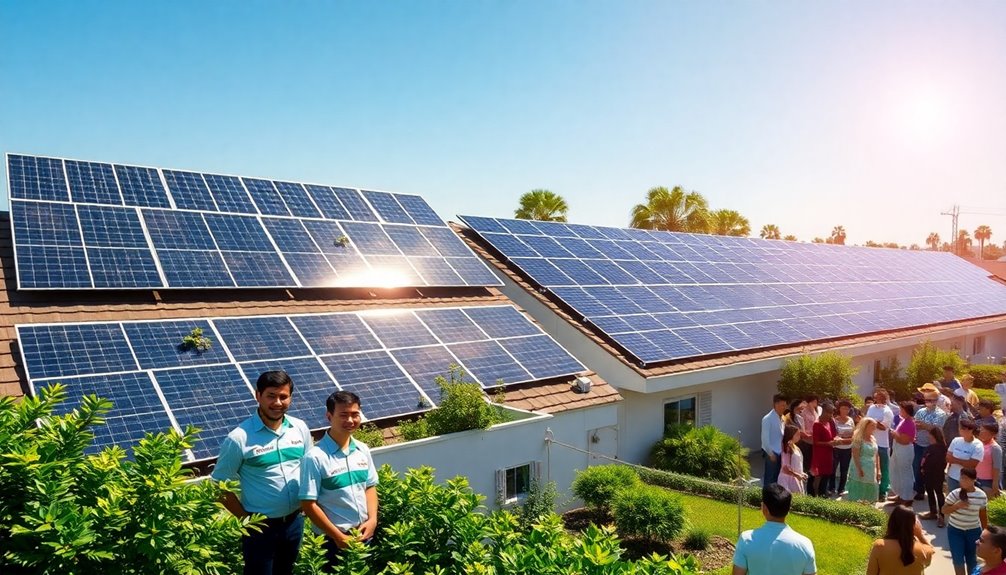You've probably noticed the buzz around solar companies lately. With a projected 75% increase in U.S. solar power generation by 2025, it's clear something significant is happening. More homes are switching to solar, driven by tech innovations and federal incentives. But what's really fueling this shift? Understanding the factors at play can shed light on why this industry is capturing everyone's attention.

As the world increasingly turns toward renewable energy, solar companies are at the forefront of this growing industry. You might've noticed the buzz surrounding solar energy lately, and it's no coincidence. The U.S. solar power generation is projected to skyrocket from 163 billion kWh in 2023 to an impressive 286 billion kWh by 2025. That's a staggering 75% increase, and it's just a glimpse of how rapidly this sector is evolving.
With over 62,500 companies currently operating globally, the solar energy industry has seen a steady growth of 1.21% in the past year alone, indicating a strong trend toward sustainability.
One of the most exciting aspects of solar energy is its rapid growth in the U.S. market, with an average annual growth rate of 26% over the past decade. You can expect solar energy to become a leading source of new electricity generation across the country. By 2030, experts anticipate that solar adoption will reach 15% of U.S. homes. This shift not only signals increasing popularity but also highlights the accessibility of solar energy solutions for everyday consumers like you.
Innovations in technology are fueling this growth. Photovoltaics continue to be a cornerstone of the industry, with over 60,000 companies dedicated to developing and manufacturing photovoltaic cells and modules. The sheer number of patents—over 65,000—demonstrates the relentless push for advancements and innovations that keep the industry thriving.
Emerging trends like distributed solar power generation, smart grids, and virtual power plants (VPPs) are changing how you think about energy. These technologies promise to enhance the efficiency of solar installations, making them even more appealing.
Policy support plays a crucial role in this dynamic landscape. Federal incentives like the Investment Tax Credit (ITC) and various state-specific rebates make solar installations financially attractive for you and other homeowners. States such as California, Texas, and Florida are leading the charge in supporting solar energy development, creating an environment ripe for growth.
The Solar Energy Industries Association (SEIA) forecasts significant solar capacity installations by 2035, underlining the importance of government policies in addressing challenges like labor shortages and grid integration. Renewable sources accounted for 22% of U.S. electricity generation in 2023, which highlights the growing significance of solar energy in the overall energy mix.
Consumer demand is driving this change, as evidenced by the completion of over 5.3 million solar installations in the U.S. Solar energy systems now power approximately 37.6 million homes, showcasing how widespread and impactful this technology has become.
Both the commercial and residential solar markets are experiencing tremendous growth, with increases of 44% and 12%, respectively, in Q4 of 2024. The public’s interest in cleaner energy solutions has surged, reflected in a 7. 01% growth in global search interest for solar energy. This heightened interest is driving innovation and investment in solar technology, leading to more efficient and cost-effective solutions for consumers and businesses alike. Additionally, the Jupiter Dex market impact is expected to further accelerate growth in the sector, as new financial platforms emerge to facilitate easier access to solar energy investments. As a result, stakeholders across the industry are poised to capitalize on this momentum, ensuring a sustainable future powered by renewable resources.
In this rapidly evolving landscape, having a strong online presence is essential for solar companies to educate and engage potential customers like you. As the demand for cleaner energy solutions continues to rise, it's clear that solar companies will remain a hot topic for years to come, changing the way you think about energy consumption and sustainability.










